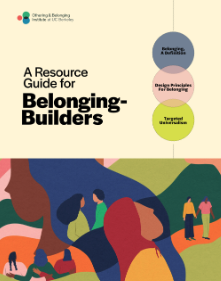Belonging Builders: A Resource Guide
A powerful, practical guide for anyone working to build systems of equity, inclusion, and shared power. Created by the Othering & Belonging Institute (OBI) at UC Berkeley, this resource outlines how to move from “inclusion” to true belonging—grounded in structural change, Targeted Universalism, and bridging across difference.
Top 5 Insights
“Othering is the problem. Belonging is the answer.”
The guide roots civic and institutional exclusion in the process of othering—a structural and narrative system that denies full humanity and participation.“Othering results in the persistent marginalization of certain individuals and groups… belonging provides the framework for creating institutions and societies that work for everyone.”
https://belonging.berkeley.edu/resource-guide-belonging-builders“Belonging is not just about being included. It is about being co-creators of the system.”
This challenges traditional inclusion efforts that invite people in without shifting the underlying power dynamics.“Belonging requires more than a seat at the table—it demands that people help design the table.”
https://belonging.berkeley.edu/sites/default/files/2023-08/OBI_DesignPrinciplesofBelonging.pdf“Structural belonging means transforming systems, not just hearts and minds.”
Belonging is not primarily a feeling—it’s a measurable shift in who designs, benefits from, and holds power within systems.“Belonging requires changes to structures and policies that perpetuate inequality, not just interpersonal acts of inclusion.”
https://belonging.berkeley.edu/sites/default/files/2023-08/OBI_DesignPrinciplesofBelonging.pdf“Targeted Universalism means we all share a common goal—but we take different routes to get there.”
This equity framework helps leaders craft policies that are inclusive and effective.“Targeted universalism starts with a universal goal and then develops targeted strategies for different groups to achieve that goal.”
https://belonging.berkeley.edu/sites/default/files/2025-05/TargetedUniversalism_FactSheet_April2025.pdf“Bridging is not erasing difference—it is strengthening relationships across it.”
The guide promotes bridging as a critical civic tool for co-liberation and shared power.“Bridging requires moving toward one another with empathy and curiosity, recognizing different life experiences and working together for mutual benefit.”
https://belonging.berkeley.edu/bridging-belonging
What’s Going On
🔹 Belonging goes beyond inclusion
Unlike inclusion—which often asks people to adapt to dominant systems—belonging requires co-ownership of those systems. It emphasizes dignity, agency, and shared design.
https://belonging.berkeley.edu/sites/default/files/2023-08/OBI_DesignPrinciplesofBelonging.pdf
🔹 Targeted Universalism in action
This approach balances the clarity of universal goals with the reality of unequal access. It’s not about choosing between “universal” or “targeted” solutions—it’s about doing both simultaneously.
https://belonging.berkeley.edu/sites/default/files/2025-05/TargetedUniversalism_FactSheet_April2025.pdf
🔹 Building bridges that hold
Bridging across race, class, culture, faith, and politics is at the heart of a functioning democracy. OBI emphasizes that bridging doesn’t erase difference—it builds solidarity around shared humanity.
https://belonging.berkeley.edu/bridging-belonging
Reflection Prompts
In your work or community, how is “inclusion” different from “belonging”?
Where have you experienced othering—and what helped move you closer to belonging?
What’s one system, policy, or structure that could be redesigned using Targeted Universalism?
Who do you need to build or rebuild a bridge with? What would that require of you?
Take Action: Build Belonging Where You Are
Explore the full guide:
https://belonging.berkeley.edu/resource-guide-belonging-buildersDownload the PDF guide for teams or coalitions:
https://belonging.berkeley.edu/sites/default/files/2023-08/OBI_DesignPrinciplesofBelonging.pdfReview the Targeted Universalism fact sheet:
https://belonging.berkeley.edu/sites/default/files/2025-05/TargetedUniversalism_FactSheet_April2025.pdfWatch or share bridging videos and tools:
https://belonging.berkeley.edu/bridging-belongingApply these tools in your coalition, school, city, or campaign—and tell others how it worked.
References
Othering & Belonging Institute. (2025, July 2). A resource guide for Belonging-Builders. UC Berkeley.
https://belonging.berkeley.edu/resource-guide-belonging-builders
Othering & Belonging Institute. (2023, August). Design Principles for Belonging. UC Berkeley.
https://belonging.berkeley.edu/sites/default/files/2023-08/OBI_DesignPrinciplesofBelonging.pdf
Othering & Belonging Institute. (2025, April). Targeted Universalism Fact Sheet. UC Berkeley.
https://belonging.berkeley.edu/sites/default/files/2025-05/TargetedUniversalism_FactSheet_April2025.pdf
Othering & Belonging Institute. (n.d.). Bridging & Belonging. UC Berkeley.
https://belonging.berkeley.edu/bridging-belonging
🧭 Engagement Tags
Engagement Level: Informed
Pathway: Learn About Civic Culture & Values
Sub-pathway: Build Inclusive Communities & Change Practice
Keywords: belonging, othering, Targeted Universalism, bridging, civic culture, equity, co-creation, design justice, narrative change
